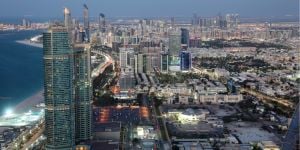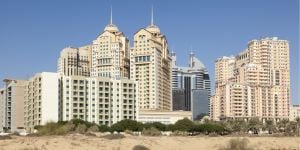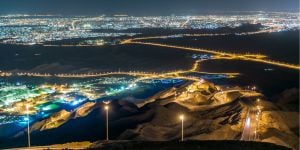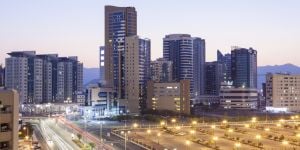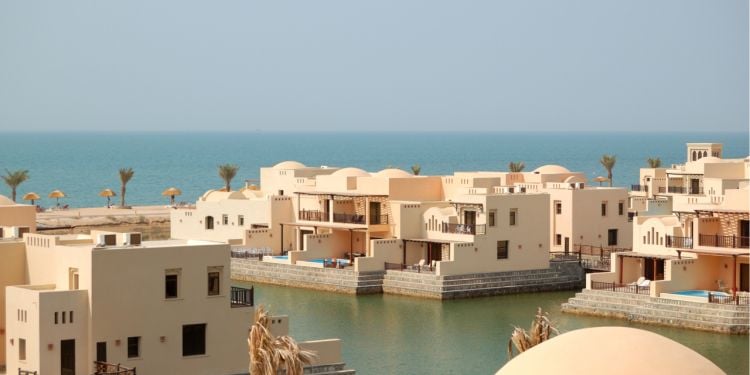
Located in the North of the United Arab Emirates, Ras Al Khaimah is an emirate that has its own unique charm. Surrounded by nature, it is quiet and laid back in spite of its rapid economic growth. This is due to the large number of visitors each year and also the many expatriates who choose to move there.
Only an hour away from Dubai, it's a popular getaway for Dubai residents during weekends and holidays. It also makes for a cheaper living environment compared to the neighboring emirate — and some expats may find it convenient to live in Ras Al-Khaimah and work in Dubai.
Various accommodation types are on offer, from mid-range to luxury villas. You will need to factor in where you would like to stay and whether you want to rent or buy a property.
Buy or rent in Ras Al Khaimah?
Naturally, there are lots of factors that will affect your decision here. The two key things to consider are probably your long-term plans for Ras Al Khaimah and your financial situation.
Renting allows for more flexibility and would probably be the best option if you are in the region for the first time and need time to explore. You can switch between apartments and leave the emirate if you need to, with no strings attached. With that, long-term renting options may be limited in popular expat neighborhoods.
Buying property in Ras Al Khaimah can be a good idea if you are planning to move to the emirate or are looking at it as an investment. If you are staying in Ras Al Khaimah for over three years, buying property may actually be a more economic option than renting in the long run. Additionally, buying property in the UAE can qualify you for a five- or ten-year residential visa (depending on the value of your investment) under the Golden Visa Program.
Buying property in Ras Al Khaimah
If you are a Gulf Cooperation Council (GCC) citizen, you will be able to purchase property anywhere in Ras Al Khaimah. All other expats can only purchase property in designated areas zoned for foreign property ownership.
There are two types of properties expats can legally purchase in Ras Al Khaimah: freehold properties and leasehold properties.
When you purchase a freehold property, you have full ownership of that property. This means that you can make changes to the property's structure, upgrade it, rent it out, sell it, etc. Freehold properties are typically very sought after by expats — and if you are planning to buy a freehold property, it may be best to get an early start.
In Ras Al Khaimah, most property is available on a leasehold basis. Leasehold properties are the ones that are available for a long-term lease (up to 100 years). You will have full rights to the home you have purchased on leasehold — but not to the land it is built on. You can live in a leasehold property yourself or rent it out. Once the lease is over, the property will go back to its original owner.
Property prices vary depending on the type of property you are looking into buying and its location. You can get a general idea of the price range in Ras Al Khaimah on Bayut.
Popular residential areas in Ras Al Khaimah
Popular residential areas in Ras Al Khaimah are Al Hamra Village, Al Marjan Island, Mina Al Arab, Nakheel, and Qusaidat.
Al Hamra
Al Hamra offers luxurious modern village-style living. It is dotted with palm trees and features luxury hotels, an 18-hole golf course, a shopping mall, and a marina.
Al Marjan Island
Al Marjan Island is known as the hidden gem of the emirate. It is a man-made archipelago with four islands overlooking the blue waters of Ras Al Khaimah. Marjan means coral in Arabic, and rightly so. For those who love the water, this place is for you, with three resorts in the vicinity, a local music festival, and luxurious villas.
Mina Al Arab
Mina Al Arab is a stunning waterfront community offering modern condos, townhouses, and family villas overlooking the coastline. Its convenient location puts you very close to Ras Al Khaimah's business district. If you're moving with your family, you'll find schools nearby, as well as plenty of parks, coffee shops and restaurants.
Nakheel
The sea view from Nakheel's housing options makes it a highly desirable location to live. As with most other areas, you'll find a host of shopping centers, restaurants, and cafes nearby. Nakheel is also known to be more affordable when it comes to the cost of living.
Al Qusaidat
Al Qusaidat is a smaller suburban community with reasonably priced property. It's a little further out (which is what brings the prices down), but major business and school areas are still relatively accessible.
Types of accommodation in Ras Al Khaimah
There are various types of accommodation, depending on what your needs are. You will most likely have to consider the commute time from and back to your office. Or if you are relocating with your family, you will need to find accommodation near schools. Once you have established this, you can begin the hunt. You can find anything from a studio to a three-bedroom house or a villa with a pool.
Housing prices vary according to the different regions. Prices in the city centre are generally higher than on the outskirts. It will also depend on how new the building is. The more modern a place, the higher the rent or cost will be.
Rent prices in Ras Al Khaimah
A studio in Ras Al Khaimah in a lovely residential area like Al Hamra is around AED 20,000 to AED 65,000 yearly, depending on the size. A three-bedroom that has a lovely sea view ranges from AED 85,000 to AED 120,000.
How to find accommodation in Ras Al Khaimah
To find accommodation in Ras Al Khaimah, you could visit the real estate websites listed below or check out classified ads in local newspapers. If you are already in the country, you might find a home through your contacts or by asking a friend or a relative to help you. In some cases, your employer could also assist you in this if they are providing accommodation for you.
Note that most properties in Ras Al Khaimah are managed by agencies. You should have no trouble finding an English-speaking agent and most agents are also used to working with expats. Sometimes, you may come across property listings made by landlords directly. If you do decide to bypass an agent and rent directly from the landlord, make sure to exercise due diligence and have someone look over your lease before signing it.
If you have your eye on a specific building in Ras Al Khaimah, you can enquire at the front office of this building about available rental options.
Renting accommodation in Ras Al Khaimah
When it comes to renting, you will probably find recent or brand new housing in Ras Al Khaimah. In a lot of cases, these will be large buildings in the city centre or villas grouped in "compounds" in the periphery. A lot of such compounds will come with amenities such as a swimming pool, sports facilities as well as security or concierge services.
There are also stand-alone villas and townhouses in Ras Al Khaimah. Many of these come with several bedrooms, large gardens, backyards, pools and more.
To rent an apartment in Ras Al Khaimah, you will need to submit the following documents to the owner:
- a copy of your residence permit;
- your passport;
- a copy of your payslips.
Make sure to check with your employer whether they will sponsor your accommodation. Sometimes your employer will pay the accommodation rental for you, and an amount will be deducted monthly from your salary. You are therefore advised to discuss this with your employer before you relocate.
Here are a few more things to take into account when renting in the UAE:
- Tenancy contracts in the UAE are typically annual;
- Rent is typically paid quarterly — but some landlords may request you to make three payments instead of four. You can also try to negotiate a monthly payment, though this may drive the annual rent price up slightly;
- You will need to pay a security deposit. Make sure to keep the receipt of your deposit — you will need it when you want to get your deposit back at the end of your rental agreement;
- If you are using an agent to rent out a place (recommended), you will need to pay the agency fee in the amount of 5% of the rental value;
- If you decide to move out before your rental contract is up, you will need to pay a penalty.
Rights and obligations of tenants and landlords in the UAE
There are rules that both landlords and tenants generally need to follow in the UAE. The specifics of your agreement will be listed in your rental contract — but it's always helpful to know what to expect. Here are some basics to keep to when renting in the UAE:
For landlords
- The landlord must offer the tenant an English-translated copy of the rental contract.
- The landlord must give you a receipt for your security deposit — whether you've paid via a bank transfer or in cash.
- It is illegal for the landlord to increase the rent on a one-year contract. Once the contract is over, however, the landlord can increase the rent in accordance with Real Estate Regulatory Authority guidelines.
- If the landlord is renting out a furnished apartment, they must provide the tenant with a list of all the items in the apartment. The tenant can then check if the list of items is correct before signing the lease.
- When renting out an apartment in an apartment building, the landlord is responsible for maintaining the common areas (hall, lobby, etc.).
For tenants
- As a tenant, you need to carefully look through your rental contract before signing it. Once you have signed the contract, no changes can be made. It is always a good idea to have a friend or a colleague look over the lease with you.
- You can only make minor adjustments to the rented property (like changing fixtures). For any major alterations, you will need to get an “okay” from your landlord — preferably in writing.
- It is illegal to sublet or share an apartment you are renting without written consent from your landlord.
- The tenant must maintain the property in good condition. If any damages have been done to the property, you will need to cover the full cost of fixing them at the end of your rental term.
- Note that bouncing a rent check is a criminal offense in the UAE. If your payment doesn't come through, the landlord also has the right to evict you. Make sure to have your financials in order, and always double-check with your landlord about whether they have received the payment.
Useful links:
We do our best to provide accurate and up to date information. However, if you have noticed any inaccuracies in this article, please let us know in the comments section below.
